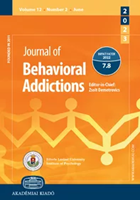Nonconforming gender expression and associated problematic smartphone and internet use among Chinese adolescents
Nonconforming gender expression and associated problematic smartphone and internet use among Chinese adolescents
Author(s): Xinyu Zheng, Yuwei Yang, Weiqing Jiang, Yitong He, Cuihong Huang, Yilin Hua, Ci-Yong Lu, Lan GuoSubject(s): Gender Studies, Social psychology and group interaction, Developmental Psychology, Behaviorism, Substance abuse and addiction, Social Informatics
Published by: Akadémiai Kiadó
Keywords: gender nonconformity; problematic smartphone use; problematic internet use; Chinese adolescents; sex differences;
Summary/Abstract: Gender nonconformity (GNC), which refers to an individual’s expression of gender that does not align with the socially prescribed norms for their biological sex, may be associated with adverse behavioral problems, such as problematic smartphone use (PSU) and problematic internet use (PIU). This study examined the associations between GNC and PSU and GNC and PIU among Chinese adolescents. Methods: This cross-sectional study utilized data from the 2021 School-based Chinese Adolescents Health Survey, recruiting 23,054 eligible adolescents aged 11 to 21, with an average age of 14.9 (SD: 1.7) years from 504 classes in 84 public high schools across 7 cities in China. Gender nonconformity, PSU/PIU, and demographics were measured. Mixed-effect linear regression models were performed. Results: Among the participants (51.0% male), 5.3% reported high GNC and 26.9% reported moderate GNC. After adjusting for covariates, high GNC was significantly and positively associated with PSU (B 5 1.11, 95% CI 5 0.49–1.72) and PIU severity (B 5 2.16, 95% CI 5 1.40–2.93). Stratified analyses indicated that the associations between GNC and PSU differed between males and females, with a significant association observed only among male students (B 5 1.91, 95% CI 5 0.97–2.86). Discussion and conclusions: GNC is positively associated with the severity of PSU and PIU among Chinese adolescents, with male gender-nonconforming adolescents being more vulnerable to PSU. These results highlight the importance of implementing education on gender expression diversity in schools to create an inclusive school environment, which may potentially help prevent PSU and PIU among gender-nonconforming adolescents.
Journal: Journal of Behavioral Addictions
- Issue Year: 12/2023
- Issue No: 3
- Page Range: 817-826
- Page Count: 10
- Language: English

